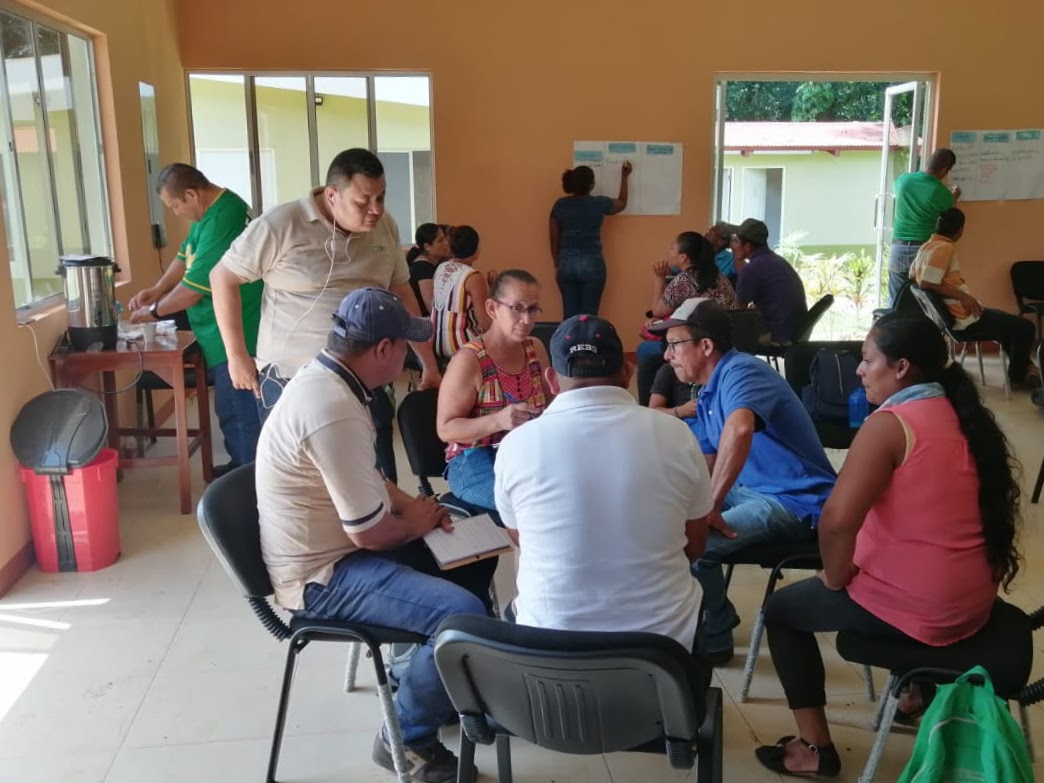Introducing a new sustainable landscape initiative within a community requires the support of actors from multiple sectors who can offer their diverse points of view.
Platform develops plan during landscape management workshop
Solidaridad, in partnership with the International Center for Tropical Agriculture (CIAT), led an initial discussion group with stakeholders from Kukra Hill to identify productive, social, and environmental challenges through a two-day workshop in August 2020. The actors proposed an action plan that will make it possible to overcome these challenges.
The stakeholders working on this action plan are part of a platform of men, women, and youth from the agriculture, conservation, community development, and planning sectors interested in implementing an integrated landscape management (ILM) initiative into the Kukra Hill area.
The workshop, titled “Intensive Course for Leaders in Integrated Landscape Management,” is part of Solidaridad’s Sustainable Landscapes Programme (PaSos) offering in the region. Mayor Carolina Morgan gave words of encouragement to participants on the first day and explained the existing legal framework that supports the introduction of ILM in Nicaragua.
It’s important to work on integrated landscape management as a platform that contributes to improving productivity, while protecting the environment and generating better living conditions for the rural population.” -Mayor Carolina Morgan
Local leaders convene to generate scalable landscape initiative proposals
Thirty participants, including 10 decision makers and 20 local leaders, such as specialists, farmers, and other professionals gathered for the workshop, through which the multi-sector participants built their capacity to be able to:
-
Identify and analyse challenges in the geographical areas where they work
-
Design strategies for integrated management of agriculture, forestry, industry and conservation sectors
-
Facilitate multi-actor collaborative processes to support ILM
Following a few presentations by Solidaridad and CIAT representatives, participants convened in work groups and drafted the first version of their proposed plan of action. Each group presented their action plan to the other participants of the workshop and the landscape initiative that was selected as a priority to be carried out is called “Family economy revitalization through annual crops and small livestock.”
When generating integrated landscape management proposals, it is important to integrate men, women and youth in the process.
“In the family economy revitalization action plan, the most interesting part is how they view the concept of scale. They want to begin with 20 beneficiaries and later continue to develop the area in a sort of chain. So as to say, ‘I was a beneficiary, and now I am going to benefit other people,’” explained Marlon López, Programme field officer for Solidaridad’s PaSos in Nicaragua.
Integrated landscape management is more than a project
Solidaridad Central America’s work in ILM began in Honduras, with the launch of PaSos in partnership with EcoAgriculture Partners in 2016. The programme promised to leverage private-public partnerships to integrate sustainable practices into the value chains of multiple sectors. This landscape initiative would boost the income of smallholder producers and other workers in tourism, energy and palm oil by promoting collaborative planning and commitment, as well as effective implementation and monitoring of the agreed-upon initiatives.
After eight years of working with the palm sector in Honduras and four years since the launch of PaSos, 100% of the sector is working towards Roundtable on Sustainable Palm Oil (RSPO) certification, and Solidaridad has managed to capture the interest of groups of women cocoa farmers, tourism sector representatives, mayors, and many other stakeholders interested in the sustainability of their region. In 2017, Solidaridad funded a translation of the Little Sustainable Landscapes Book into Spanish, to further drive the multiple benefits that this model can provide for the region.
Establishing internal auditors for RSPO certification was an important landscape initiative that drove the implementation of best practices in the palm sector.
The success of the programme in Honduras paved the way for the launch of PaSos in the South Caribbean Coast Autonomous Region (RACCS) in Nicaragua, also in 2017.
“Our goal is to facilitate dialogue and empower the various actors who cohabit in the RACCS, so that they can define their own vision towards sustainable landscape management, providing the necessary tools to reach it”, said Michaelyn Baur, regional director for Solidaridad Central America, Mexico and The Caribbean.
Read more about our work in Palm Oil.

